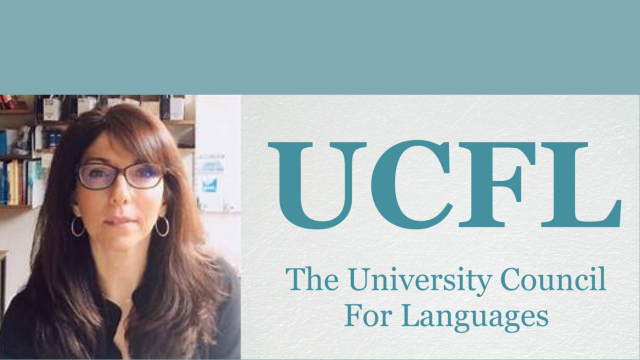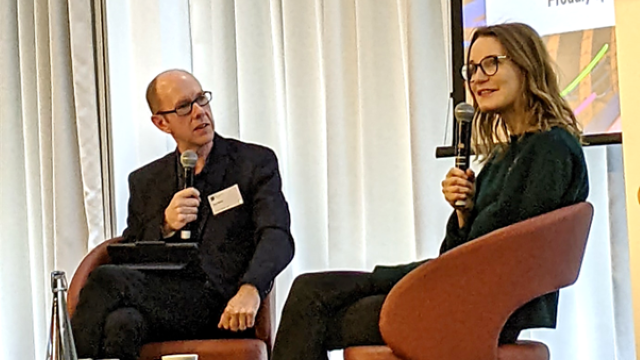-
QUALIFICATIONS
- For Linguists Worldwide
- For UK Public Services
- Preparation
- Policies & Regulation
-
MEMBERSHIP
- Join CIOL
- Membership grades
- NEW for Language Lovers
- Chartered Linguist
- Already a member?
- Professional conduct
- Business & Corporate Partners
-
ASSESSMENTS
- For Second Language Speakers
- English as a Second Language
-
EVENTS & TRAINING
- CPD, Webinars & Training
- CIOL Conference Season 2025
- Events & Networks
- CIOL Mentoring
-
NEWS & VOICES
- News & Voices
- CIOL eNews
- CIOL Awards
- The Linguist
- Jobs & Ads
-
RESOURCES
- For Translators & Interpreters
- For Universities & Students
- Standards & Norms
- CIOL & AI
- All Party Parliamentary Group
- In the UK
- UK Public Services
- Find-a-Linguist
The Impact of AI on the Language Industry: Opportunities and Challenges

At a recent session organised by the Association of Interpreters and Translators (AIT), CIOL Chief Executive John Worne presented on how artificial intelligence (AI) is transforming the language profession and industry. The event, moderated by Irina Norton, Chair of AIT, brought together language professionals to discuss this timely and critical topic.
John began by highlighting that language professionals have already experienced numerous technological revolutions, particularly in translation, with tools like terminology databases, translation memory, and machine translation (MT). However, the emergence of generative AI in 2023 has introduced a new level of unpredictability and potential disruption to the field.
From the initial excitement of the 1950s Georgetown Machine Translation experiment to the current boom in generative AI tools like ChatGPT, Claude, and Microsoft's Copilot, John emphasised that while these tools offer impressive capabilities, they also come with significant risks and limitations.
One crucial point he highlighted was the varying quality of machine translation across different languages. While MT performs reasonably well for core Romance languages and German, for example, its effectiveness diminishes significantly for languages like Chinese and Japanese, and it can be nearly useless for languages which are less commonly included in AI training data in English-speaking countries, including many African languages for example.
Generative AI, which uses complex pattern recognition to predictively generate text based on prompts, presents both opportunities and challenges for linguists. John cautioned that while these tools can be remarkably fast and capable, they also pose risks such as hallucinations (generating convincing but false information), data leakage, and the potential for ‘fatal errors’ with grave consequences in translations.
As for interpreting, John referenced research from the University of Surrey indicating that AI tools can enhance the performance of highly skilled interpreters but may hinder less experienced ones due to increased cognitive load. He also noted the particular challenges of using AI in real-time interpreting, where language structure and cadence are critical factors.
For translators, the advent of Generative AI has led to mixed experiences. While some report increased efficiency and more work, others have seen negative impacts on rates and fees. John stressed the importance of building understanding and then integrating AI tools into translation workflows only as appropriate and safe, a process that is still evolving for many professionals.
The discussion also touched on the ethical considerations and potential misuse of AI in sensitive contexts. John shared concerns about the inappropriate use of AI translation tools in public service and healthcare settings and in local government, where financial pressures might lead to compromises in the quality and availability of languages support. He emphasised the need for national-level accountability and commitments to standards, particularly in public sector contexts.
A significant portion of the Q&A session focused on practical challenges faced by linguists and language professionals. These included detecting AI-generated content in student assignments, dealing with AI-imposed pressure on translator rates, and navigating the ethical considerations of AI use in public service, legal and medical settings.
Looking to the future, John stressed that no-one has a ‘crystal ball’ but predicted that, on balance, translation technologies would likely continue to diverge, with more specialised tools for professional linguists developing separately from mainstream 'consumer-oriented' AI translation apps and browser-based tools. He stressed that human linguists will remain essential due to their unique ability to understand context, nuance, and cultural significance in communication.
CIOL's stance on AI highlights the risks and challenges whilst recognising the inevitability of technological progress and the opportunities AI presents, for example: for content generation, efficiency gains, and quality assurance. CIOL is committed to providing regular updates and resources to help members and stakeholders navigate this rapidly evolving landscape.
What is for sure is that the human element in language services will remain irreplaceable, with the most skilled linguists likely to be in higher demand as the industry adapts to this new technological frontier. While AI tools offer remarkable capabilities and potential efficiency gains, they also present significant challenges in terms of accuracy, reliability, and ethical use. As the field continues to evolve, the premium for language professionals will be in staying informed, being adaptable, and remaining committed to maintaining high standards of quality and ethical practice.
More
The Chartered Institute of Linguists (CIOL), Incorporated by Royal Charter, Registered in England and Wales Number RC 000808 and the IoL Educational Trust (IoLET), trading as CIOL Qualifications, Company limited by Guarantee, Registered in England and Wales Number 04297497 and Registered Charity Number 1090263. CIOL is a not-for-profit organisation.







